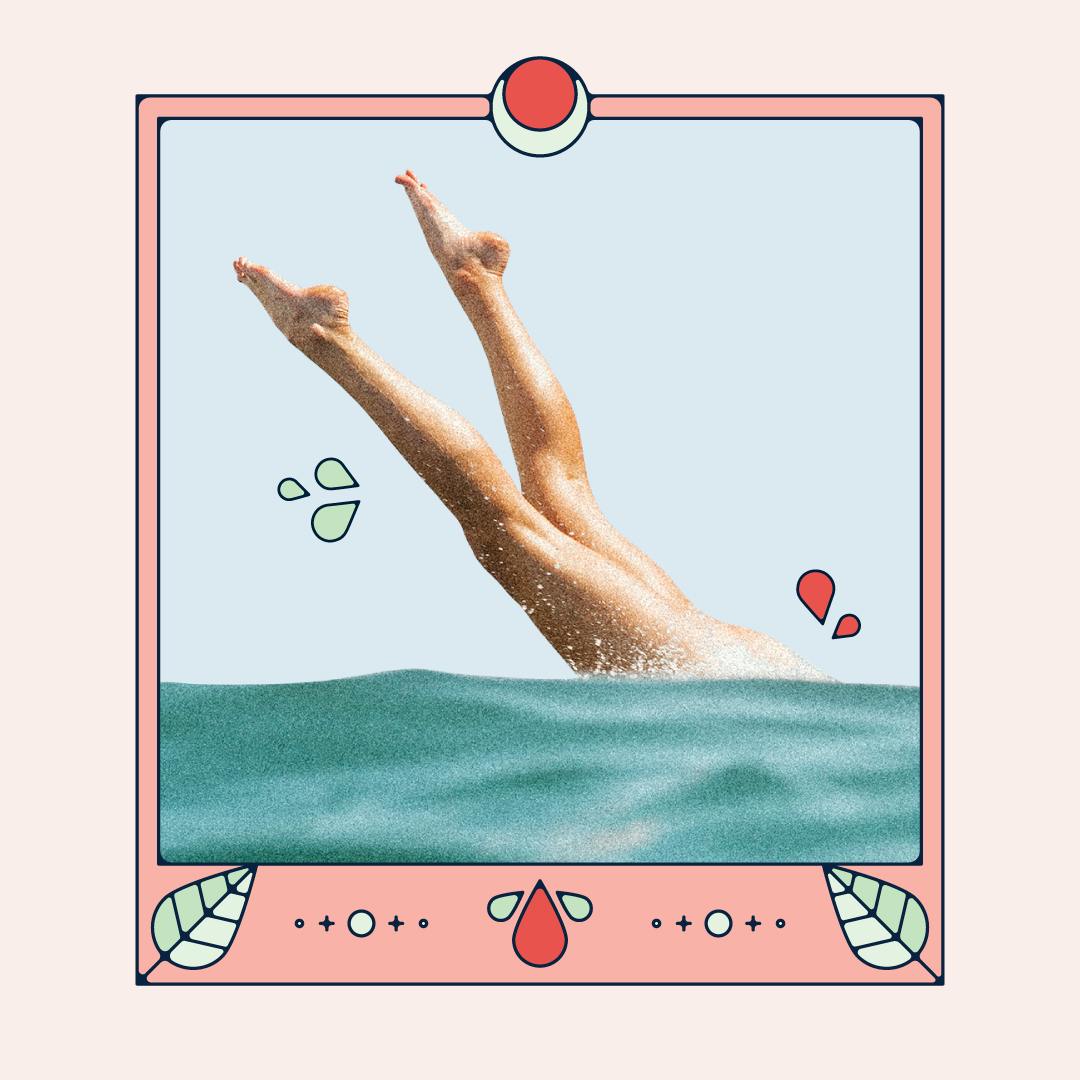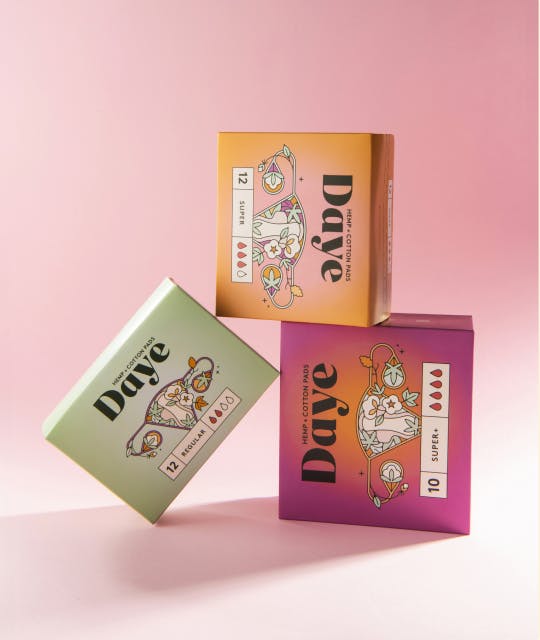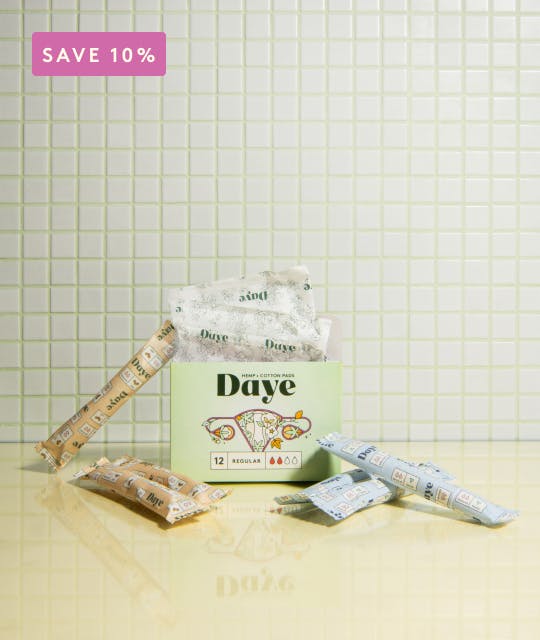Table of contents
1. First things first: Can you go swimming on your period?
2. Period products for swimming (and how to use them)
3. Is swimming good for you on your period?
4. Is there a stigma around swimming during your period?
5. Conclusion
Written by Izzie Price
Illustrated by Erin Rommel Erin Rommel
Whether it's a dip in the sky-blue ocean, a cold water dip, or snapping that swim cap and getting some exercise at your local pool, swimming is a popular activity among all ages and genders, and a great way to maintain your overall well-being. However, for women & AFAB individuals, swimming can be a complex activity to navigate. From which period products to use in the pool to how to stay comfortable, we're going to answer all your questions about swimming on your period.
First things first: Can you go swimming on your period?
Absolutely. It's completely safe to swim on your period. In fact, swimming is a type of exercise you may find beneficial when on your period as some studies show that exercise can help alleviate menstrual cramps and PMS.
Around the world, people swim on their periods every day. From professional swimmers to people on vacation, it's completely normal to take a dip in the pool during this stage of your menstrual cycle. If you do swim on your period - you’re not alone, but joining a large community of menstruating swimmers.
Let's address some common questions and misconceptions, which are frequently rooted in biases and preconceived notions about menstruation and period blood.

Is swimming on your period hygienic?
Hygiene is one concern that people may have about heading to the pool to swim some laps during that time of the month. However, even if your period makes you feel more cautious about personal hygiene while swimming, there's nothing to worry about. Pool water contains halogen such as chlorine or bromine which kills bacteria and reduces the risk of infection – there's no greater risk of getting sick while swimming on your period than on any other day. This is also true if you are swimming outdoors such as in an ocean or a lake. Remember that the vaginal canal is a muscle, rather than an open cavity, so it does not stay open for water to come in during swimming. This is also why your tampon or period cup will stay in place while you are swimming.
Another hygiene concern is leaks - some of us might feel worried by the prospect of leaving a bloody trail behind them in the water! Fortunately, this is pretty unlikely. But if you do experience a leak, the menstrual blood will be quickly dissolved in the water when you swim. Unless you have an STI, there is nothing dirty or unhygienic about your menstrual fluid – it’s a normal part of life!
Does the water pressure stop your flow temporarily?
Some people assume that the water pressure stops your period blood from flowing while in the pool, but we’re here to tell you that this is a myth. Even though water pressure may reduce the flow, it usually does not make your period stop altogether while bathing. Plus, you still have to get in and out of the pool, where your flow might return! For this reason, many swimmers feel more comfortable using period products while swimming and bathing. That being said, some of us prefer freebleeding and we’re here to celebrate all period care choices and bust common menstrual health taboos!

Does period blood attract sharks?
Another concern that some people may have is that swimming in the sea on their period may somehow alert nearby sharks and lead to attacks.
There are multiple misconceptions at play here. First of all, shark attacks are incredibly unusual – the average person has a greater chance of being hit by lightning than of being attacked by a shark. Secondly, sharks aren't as good at detecting blood as we commonly believe; they won't swim from miles away because of a whiff of blood in the water. And, thirdly, menstrual blood isn't the same as blood coming from your veins or an open wound. It's actually a combination of discharge, cervical mucus, endometrial particles, and a fairly small proportion of actual blood.
Overall, there's no evidence for a greater likelihood of sharks attacking people who are menstruating. Sharks aren't that interested in attacking humans, anyway.
Period products for swimming (and how to use them)
1) Tampons
Tampons absorb menstrual blood before it leaves your body,2 so they're an ideal solution for swimming on your period. Just insert a tampon, put on your swimming costume, and head to the local leisure centre or pool party.
Although tampons can be worn for up to eight hours at a time, it's best to change your tampon just before and just after getting into the water. Because tampons are so absorbent, they may soak up a little of the water as well as your period flow. Therefore, if you're swimming in untreated or contaminated water, it’s a good idea to change the tampon afterwards to avoid vaginal infection. However, don’t worry too much about vaginal infections and swimming – your vaginal microbiome and the good lactobacilli bacteria in it should protect you from pathogens.
One concern that you may have about wearing tampons in swimming pools is the risk of the string showing. While we are here to celebrate periods with pride and not afraid of a little string showing, If you're worried about the tampon string slipping out of your swimsuit, here are some tips:
- Wear shorts-style swimwear or pop some regular shorts over your bikini at the beach for additional coverage.
- Use nail scissors to trim your tampon string after inserting it – make sure there's sufficient length to easily remove the tampon.
- Remember that a stray tampon string doesn't actually matter; worrying about it shouldn't ruin your workout or beach vacation. If it bothers anyone, that's their problem, not yours!

2) Menstrual cup or menstrual discs
Another popular period product for swimming is a menstrual cup or disc. These are small receptacles usually made of medical grade silicone or latex which catch the menstrual fluid. Because these are worn internally, they are a convenient option for swimmers who don't want to worry about tampon strings or potential leaks.
The main downside of menstrual cups or discs is that they need to be cleaned between uses, which can be more difficult when swimming outdoors at the beach with potentially limited toilet facilities. Remember to always boil your period cup after each use for at least fifteen minutes as otherwise bacteria and harmful pathogens can start growing on it. Washing your period cup with soap and water will not be enough to remove any pathogens and bacteria.
3) Period-friendly swimwear
Looking for alternative pool day period solutions to tampons and menstrual cups? Period-friendly swimwear has increased in popularity in recent years, designed to absorb period flow without any need to insert a tampon or menstrual cup. The swimwear works by using highly absorbent materials in the gusset and a leakproof outer layer, just like regular period pants. While it may not be enough to keep you leak free on the heaviest days of your menstrual cycle, period swimwear is great for lighter flows or spotting.
4) What about pads?
Although period pads are a popular option on land, they don't perform well in the water. They can become sodden and lose their stickiness which keeps them in place, making them ineffective in the pool. For anyone who prefers using pads during their time of the month, period swimwear may be the best alternative.
Is swimming good for you on your period?
While some people may feel no desire to splash around in the pool during their period, for others swimming laps can be a great way to relieve period cramps. During exercise, the body releases endorphins, those feel-good hormones that act as natural painkillers and can make period pain go away. Plus, even if you're not ready for a workout, a dip in the pool or sea can be a welcome distraction from period pain. So, pop in a tampon or menstrual cup and enjoy the water!
Is there a stigma around swimming during your period?
As with many things relating to menstruation, there's still a taboo around periods and swimming in many countries. In fact, Chinese swimmer Fu Yuanhui made headlines around the world during the 2016 Rio Olympics when she told an interviewer that her period started the night before. In China, there has traditionally been a stigma around menstruating people swimming; common misconceptions around tampons breaking hymens and taking the user's virginity have also contributed to this silence surrounding swimming on your period. It's no surprise, then, that Fu Yuanhui's brave admission made waves on Chinese social media.
These beliefs around periods and water are not limited to China. All around the world, different cultures have their own versions of this belief. For example, in some countries across Asia, the Middle East, Europe, and South America, women are told to avoid swimming, bathing, or even washing their hair during their periods for fear of sickness or infertility. In some parts of India, for example, women are not even allowed to take a bath during the first few days of their period because of a misguided fear of contaminating the water.
Closer to home, there's more openness around periods and swimming, but many people still feel uncomfortable about getting in the pool once they start bleeding. Recently, a group of athletes including former Olympic swimmer Hannah Miley have campaigned for more openness around periods in sports with the #SayPeriod campaign, which aims to break down the taboo. By supporting campaigns like this and having open conversations about menstruation, we can all play a part in normalising swimming on your period.
Conclusion
Anyone who has experienced periods (or has loved ones who do) knows that menstruation is surrounded by vast webs of myths and misconceptions. The confusion around swimming on your period is no exception – many people still don't know that it's just as safe and hygienic to swim on your period as any other time of the month. By having open conversations about menstruation and trying out different pool-friendly period products such as tampons, menstrual cups, or period swimwear, we can continue to enjoy a dip in the water and reduce the stigma.
If you're looking for new period products to help you swim on your period, check out what we have in store.
Relevant products









